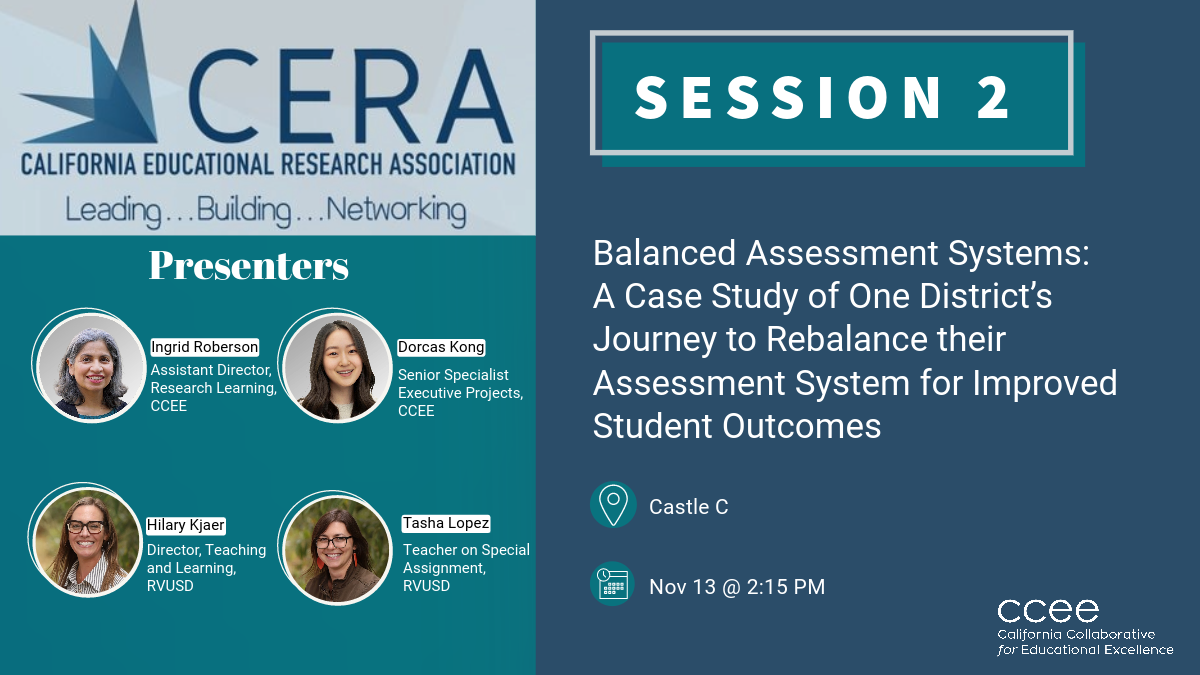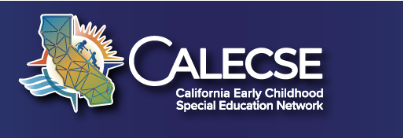
- This event has passed.
Balanced Assessment Systems: A Case Study

Balanced Assessment Systems: A Case Study of One District’s Journey to Rebalance their Assessment System for Improved Student Outcomes
In the 22-23 school year, the California Collaborative for Educational Excellence (CCEE) launched the Data Research Learning Network (DRLN) to support districts and counties across the state in innovating their data and assessment practices. The DRLN is organized into three strands:
Deeper Learning: Accelerate deeper learning through formative assessment practices, including student agency in the learning process
Data Review: Assess current data and assessment programs to determine opportunities for innovative data-driven strategies
Data Dashboards: Enhance real-time data, discussions and decisions by end-users who are teachers, administrators, and community
In this session, as part of the Deeper Learning strand, Rincon Valley Union School District (RVUSD) shares their learning experience to create a more balanced system of assessments with a special focus on formative assessment practices in mathematics.
The first part of this session focuses on the core concepts of Balanced Assessment Systems and the special role of Formative Assessments, grounded in the collaborative work of CCEE and the Center for Assessment. An assessment system is balanced when it is coherent, comprehensive and continuous, rooted in a common model of learning. (Center for Assessment, 2019) This session unpacks these three core concepts and the two additional design considerations of utility and efficiency as districts move to rebalance their assessment systems. (Center for Assessment, 2019).
The second part of this session features the application of the core concepts of Balanced Assessment Systems in Rincon Valley Union School District. RVUSD district leaders share their learning experience of re-balancing their assessment system, including the first two steps of conducting a needs assessment and creating an action plan. Special attention is paid to the role of formative assessment practices in the content area of mathematics.
After this session, participants will leave with a starter toolkit for Balanced Assessment Systems, consisting of tools for a needs assessment and action plan. Participants will also have access to CCEE’s MicroLearning courses on Balanced Assessment Systems and Formative Assessments to help start their own innovation journey. Each micro-courses is divided into different parts containing pre-recorded video presentations that are between 15-25 minutes long, as well as hyperlinks within the presentation handouts to additional resources and materials.
RVUSD’s action-oriented research presents initial findings from their first year of participation in CCEE’s Data Research Learning Network, focusing on formative assessment in mathematics. Lessons learned center on building district capacity to better balance their system of assessments as bolstered by research conducted by the Center for Assessment in collaboration with CCEE. The DRLN offers state-level amplification by documenting and disseminating innovative learning experiences to help other districts hoping to start their own innovation journeys.
Reference
Center for Assessment. (April 30, 2019). The Challenges and Opportunities of Balanced Systems of Assessment: A Policy Brief. [Policy Brief] https://www.nciea.org/wp-content/uploads/2022/09/Assessment-Systems-Policy-Brief.pdf
Learning Outcomes
- Participants will be able to define the core concepts of a Balanced Assessment System and the key role that formative assessments play in improving learning and instruction.
- Participants will understand how to conduct a systems needs assessment and the benefits that result.
- Participants will learn about potential barriers to re-balancing an assessment system and practical ways to navigate these challenges.
- Participants will be able to identify where the core concepts of a Balanced Assessment System appear in Rincon Valley USD’s action plan.
Engagement
Participants will be asked to interact with others to identify and discuss examples of the core concepts in the RVUSD action plan and process presented such as coherent, comprehensive and continuous, rooted in a common model of learning. Throughout the session, participants will be asked to reflect on their own system as it applies to the information presented; their current assessment system, how they might conduct a needs assessment, and anticipated challenges. Participants will be invited to ask questions of the presenters to clarify their understanding of the materials presented.


